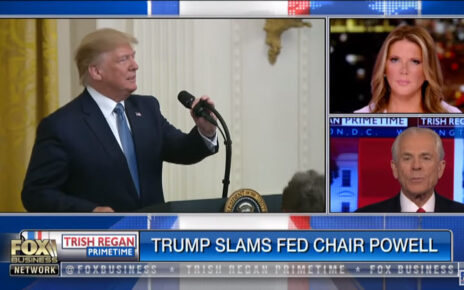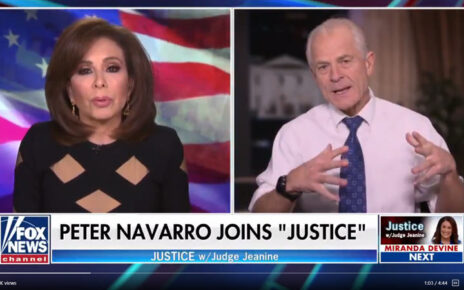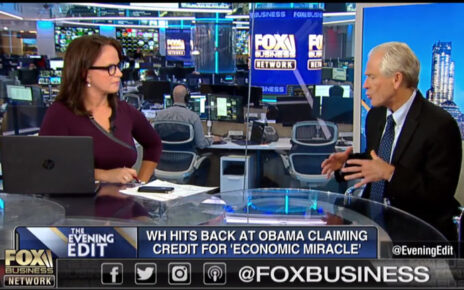Peter Navarro on how US is fighting the spread of coronavirus | Fox News Video
White House trade adviser Peter Navarro joins ‘Sunday Morning Futures.’
August 8, 2019 – Fox Business Network, Maria Bartiromo
TRANSCRIPT
BARTIROMO: Joining me right now with more on its impact is Peter Navarro. He is White House trade adviser.
And, Peter, it’s always a pleasure to see you. Thank you for being here.
PETER NAVARRO, DIRECTOR, WHITE HOUSE OFFICE OF TRADE AND MANUFACTURING POLICY: Good morning, Maria.
BARTIROMO: What kind of an economic impact are you expecting from this coronavirus?
And I want to ask you about what the U.S. is relying on from China, because I know that there were plenty of ships that were supposed to be carrying medical equipment, medical supplies, parts, components, which now the U.S. is not getting because China is holding onto those things, or they can’t even produce them.
NAVARRO: Yes.
Maria, my job at the White House during this crisis is to review the supply chains we need to treat corona. There’s over 30 different elements just for that alone.
And what I have learned so far, and not surprisingly, is that we have offshored far too much of our supply chain, not just for corona, but also for the essential medicines we need, same reasons we offshored a lot of our other stuff. It’s cheap labor environment, lax environment, and, most of all, unfair trade practices.
A lot of it’s in China. Some of it’s in India. Some of it’s in Europe. But we got to get that back onshore.
In terms of the immediate issue, face masks, the N95 face masks, China put export restrictions on those masks, and then nationalized an American factory that produces them there.
So , we’re dealing with that in Trump time. This week, we’re going to be sending out an RFP to make sure we got plenty of those. We have to look across four different elements.
It’s the protective gear, like the face masks. It’s the treatment drugs, like remdesivir, that we’re trying to get into clinical trials quickly. It’s the vaccine development which we’re moving in Trump time. We’re going to be able to get — possibly get a vaccine in half the time it usually takes.
And there’s also these point-of-care diagnostics, so that we can accurately determine whether a patient has corona and doesn’t have to come to the hospital.
So, bottom line, Maria, is that this administration is moving as rapidly as possible. And my — my part of the portfolio is to make sure our supply chains are secure and we have what we need.
BARTIROMO: Well, you make a lot of important points.
And I know that the president has been trying to get the supply chains back to North America, get the manufacturing base of our country…
NAVARRO: Yes.
BARTIROMO: … out of places like China, or lessen them at least, so that we don’t have to be reliant on these things.
But what’s the impact on the economy? I mean, if we are going to see all these shortages, isn’t that going to cut into earnings? Are you expecting a significant impact on growth, Peter?
NAVARRO: Yes, let me say one last point on the supply chain issue.
For the American people, they need to understand that, in crises like this, we have no allies. Back in 2009, during the swine flu problem, our best friends in Australia, Great Britain, and Canada basically denied us what we needed.
BARTIROMO: Right.
NAVARRO: Australia refused to send 35 million doses of vaccine.
With respect to the economic impacts, Maria, I think what we have learned, with President Trump’s tough stand on China, is that the American economy is extremely strong and not particularly vulnerable to what happens in China.
So we’re going to go about our business and try to get what we need in Trump time.
BARTIROMO: OK, we’re going to take a short break.
You have an op-ed out in The Financial Times that you want to talk about. And you did a blitz in terms of the counterfeit products coming from China. We have got to talk about that as well, Peter.
NAVARRO: Scary stuff.
BARTIROMO: Stay with us.
NAVARRO: Yes.
BARTIROMO: We will take a short break.
And we have got more with Peter Navarro when we come right back.
(COMMERCIAL BREAK) BARTIROMO: Welcome back.
We’re back with White House trade adviser Peter Navarro, who just came off of a visit to JFK.
Peter, tell us what you saw at JFK, when you witnessed all of these counterfeit…
NAVARRO: Yes.
BARTIROMO: … products coming into America.
NAVARRO: Oh, I saw great Americans out there trying to stem this flow of counterfeits.
It’s a thing called Operation Mega Flex, which the White House has been coordinating with Customs and Border Protection. What we do once a month is look under the hood of thousands of packages from China.
And I’m telling you, Maria, this is a horror show. What I learned is two things, that China is the great counterfeiter of the world, and Amazon and eBay and these e-commerce platforms are the great counterfeit enablers.
I saw — saw stuff, a bunch of counterfeits that defraud you, but could burn your house down, kill you. I saw fentanyl on the table that had been seized within the last 24 hours, gun silencers, a whole pile of fake driver’s licenses, and cancer drugs that people are paying thousands of dollars for that have no active ingredients for.
And these packages, there’s a million a day, Maria, a million packages a day by air from China. About 10 percent of those, we’re finding, have contraband in them. And that means 100,000 Americans every single day are subject to fraud from China through e-commerce platforms like Amazon, Alibaba, eBay.
BARTIROMO: And we just were looking at some pictures. Some of them were these driver’s license. Who knows what they’re doing with these driver’s license?
I mean, some sanctuary cities are giving people driver’s license, and then they’re going to vote.
NAVARRO: Yes.
BARTIROMO: So we don’t know what they’re doing with these driver’s licenses.
NAVARRO: Well, I was there with both Customs and ICE agents there.
And they were telling me how those licenses, if they’re used in a sanctuary city or state, they can’t track what they’re doing. And it’s terrible. It endangers Americans.
There was a table there with a bunch of food products from China that had pork in him that potentially had the African swine flu that could take out the whole supply chain for pork in America.
BARTIROMO: Unbelievable.
NAVARRO: So this is a horror show.
BARTIROMO: Yes.
NAVARRO: The Trump administration is going to crack down on this. We’re going to do everything we can on this counterfeit problem.
But Americans, when you are shopping online, you have got to be careful here, until we get this problem under control…
BARTIROMO: Peter…
NAVARRO: … because you can’t trust Amazon or Alibaba.
BARTIROMO: Also, in early March, there’s the World Intellectual Property Organization electing a new director general.
This is a U.N. agency, but China wants to be that — that leader in that as well, right?
We only have a couple of seconds here, Peter.
NAVARRO: Yes, WIPO, 43 million patents. They’re trying to gain the director generalship of that.
But they also already control 14 of 15 agencies. They have bungled the WHO, because they have a proxy running that.
BARTIROMO: Yes.
NAVARRO: That’s why we’re having more problems with the coronavirus.
BARTIROMO: Well, check out…
NAVARRO: This, again, is a crisis.
BARTIROMO: Check out your op-ed in The Financial Times on this.
Peter, good to see you.
Have a great Sunday, everybody. I will see you tomorrow.



